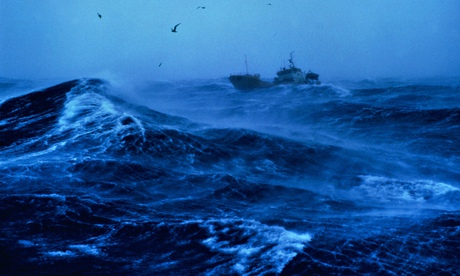
As true-life tales of endurance and survival go, Matt Lewis's is one of the most dramatic in recent memory. And yet, until now, his story was virtually unknown in Britain, thanks to his being the only Brit on board his ship. Now the tale of his experiences in 1998 on the doomed vessel Sudur Havid should take its place alongside The Perfect Storm as a chilling account of how a mundane fishing trip can go fatally awry.
Writing in unflashy and economical prose, Lewis describes how at the age of 23 he was offered a job as a marine biologist observer on the Sudur Havid, a fishing boat making a routine trip from Cape Town into the Antarctic. Regarded by the experienced crew as an irksome presence, Lewis saw the job as a holiday of sorts, using his scientific background to chart the various birds and fish that he encountered on his journey.
It soon became clear that the Sudur Havid was less than seaworthy, thanks both to its owners' apparent unwillingness to spend money on its maintenance and to the tensions between many of the crew members, notably the South African and Namibian sailors, neither of whom appeared to trust the other.
This difficult situation was soon worsened by an enormous storm which flooded the boat almost immediately, sending the 38 men on board to the rafts in a desperate struggle for survival. This, Lewis chronicles in unflinching and gripping detail. If you've ever wondered why a so-called survival suit can make all the difference between living and dying, it's all explained here.
If Lewis's admirably spare and uncluttered style makes the drama come alive in visceral fashion, it sometimes runs into difficulty. There is the occasional half-hearted stab at deeper "meaning": when an albatross appears, it comes as little surprise to find that eventually another crew member dies; cue the comment that "everyone knows that it's bad luck to kill an albatross".
Lewis also uses the distracting device late in the book of attempting to depict what was happening on the other life raft, via the third-person narrative of his crewmate Stephan. While undeniably valuable for Lewis's account of events, the prose here feels pretentious – "Snapshots of his life flashed before him and dissolved".
But these are minor cavils compared to the greater achievement at hand, which is to produce a story of survival against the odds that is simultaneously terrifying and stirring. Lewis skilfully depicts the horror of the events even as he depicts himself as the unassuming hero of the hour, taking control because nobody else was capable or willing.
Flecked with black humour – an early attempt to break the ice by discussing the then-recent release of the film Titanic does not go down well with the crew – and clear enough in detail for the most landlubber of readers to understand all the seaborne action, Lewis's book deserves high praise. And the inevitable film adaptation should be terrific.
Last Man Off is published by Viking (£16.99). Click here to buy it for £13.59 with free UK p&p

